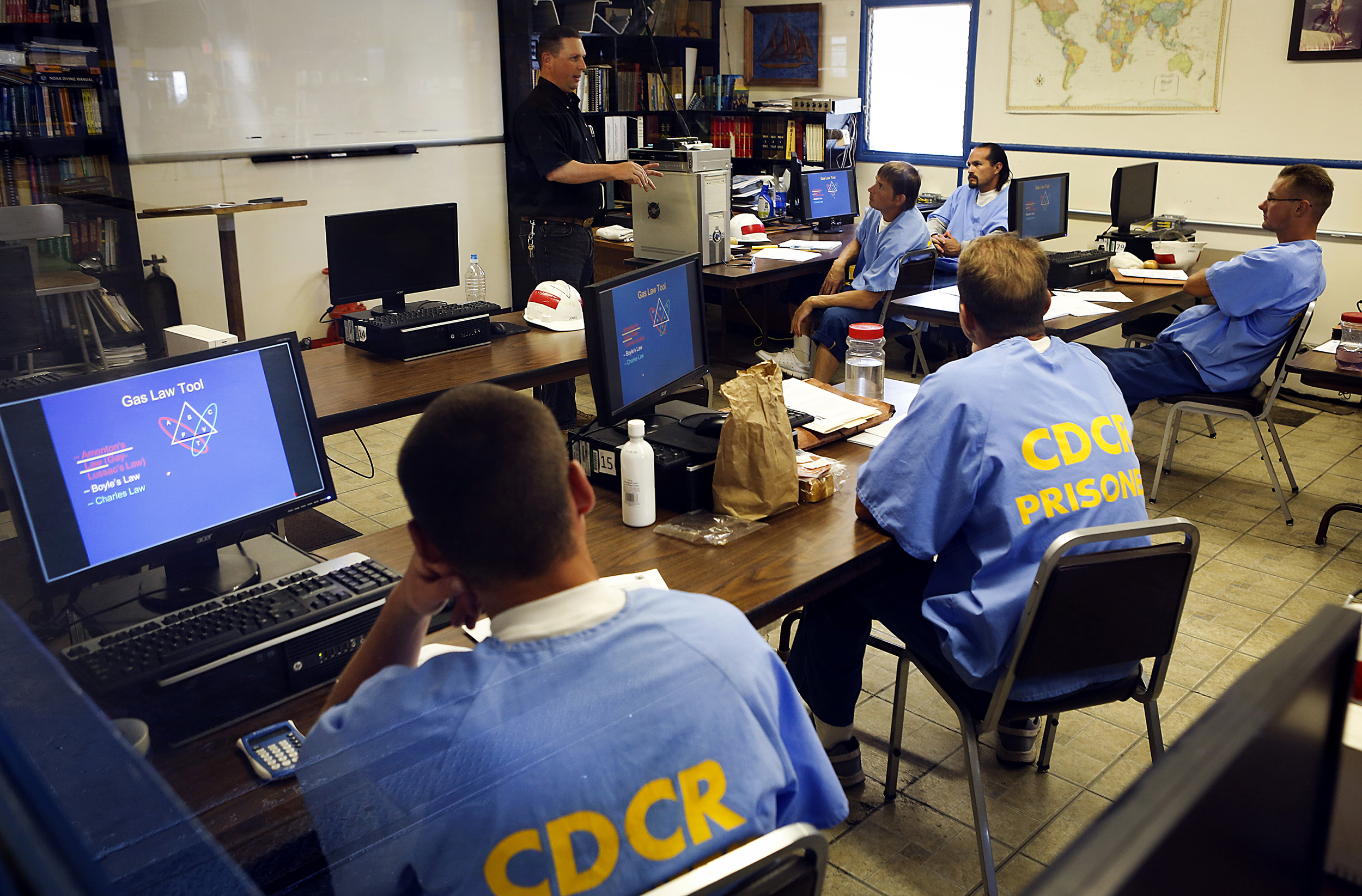By: Ashlynn Huebner and Forrest Holcomb
Recidivism in Louisiana and Across the Nation
In the United States of America, one of the biggest issues facing the Criminal Justice System is recidivism, as nearly 44% of criminals nationwide will return to the system in some way within their first year after being released. In the state of Louisiana, known as one of the worst states in the country in terms of incarceration rates, the percentage is actually lower than the nation’s average, with ⅓ of prisoners returning within one year. However, the 5-year recidivism rate is 42%, showing that as time goes on, the prisoners of Louisiana tend to revert back to similar tendencies as the rest of the nation.

Inmates in California receive education while incarcerated.
The people and government of the state are working hard to fix these issues, with the recidivism rate actually dropping in recent years, a good sign for the future. This is being executed through education programs in prison, which are a high priority, as 48% of the people imprisoned in Louisiana enter the system without a high school diploma. Therefore, the prison system offers lots of basic education to get these people caught up with those who were able to make it all the way through American public schooling. These programs include General Education Development degrees, or GEDs, along with opportunities such as special education and literacy classes.
The Benefits of Re-Entry Programs
With one of the highest incarceration rates in the country, Louisiana has a large number of formerly incarcerated individuals. With numbers like the fact that Louisiana has an incarceration rate of 638 per 100,000 (the highest in the country), there are bound to be many programs that focus on aiding these individuals in prevention from re-entering the prison system and instead going back into their former life. Louisiana Prisoner Reentry Initiative (LA-PRI) is one of the many programs that hope to make certain that all individuals who are released from prison and back into the parishes of Jefferson and St. Tammany will have many opportunities of receiving a job with a livable wage, staying out of the prison system, and living healthier lives where they can contribute to their community.
Programs similar to this are necessary, especially in areas with such high incarceration, for they bring a glimmer of hope to an area where 75% of formerly incarcerated people still remain jobless a year after their release from prison. Between the discrimination, high living wages, and the search for jobs, it can be hard to find a way to successfully re-enter a society that has continued to grow while these individuals’ lives on the outside were halted while incarcerated. This is why there is such a high need for programs that aid the formerly incarcerated in getting accustomed to their new lives. The implementation of Halfway Houses, nonprofit organizations, Transitional Living houses, and other programs is beneficial in providing a system of support and education to the formerly incarcerated.

Education Systems to Aid the Incarcerated
Education is very important in this process because, in certain situations, a number of those who are incarcerated do not have an opportunity to reach higher levels of education. It is common for the incarcerated only to have an education as high as eighth grade, and a large percentage of the prisoners do not have a high school or college diploma. In order to break this cycle, there are correctional education programs within the prison that work to provide necessary skills and lessons to those who are incarcerated. While it is not perfect, organizations such as the Louisiana Prison Education Coalition (LPEC) are working to improve the education rates both inside and outside the prison. This goes along with the decreasing recidivism rates in the state, for while it is not a low percentage overall, it is still experiencing a reduction in comparison to other states in the US.
This piece is part of an ongoing series from Professor Betsy Weiss’s class, “Punishment and Redemption in the Prison Industrial Complex,” which is offered through Tulane University’s School of Liberal Arts Young Public Scholars (YPS) Program, a pre-college summer program designed specifically for the emerging social justice advocate.
 NOLAbeings Multimedia artist Claire Bangser created NOLAbeings as a portrait-based story project that marries...
NOLAbeings Multimedia artist Claire Bangser created NOLAbeings as a portrait-based story project that marries...  Voodoo in New Orleans: Reviving history: New Orleans fortune telling This article takes a deep dive into the history of Voodoo in New Orleans, its hybridization with Catholicism, and its present-day place in the city's culture. The author visits fortune-tellers in the French Quarter, using their guidance as a tool for introspection rather than a deterministic predictor of the future. Through her experiences in New Orleans, the author feels a mystical connection to both the past and the future.
Voodoo in New Orleans: Reviving history: New Orleans fortune telling This article takes a deep dive into the history of Voodoo in New Orleans, its hybridization with Catholicism, and its present-day place in the city's culture. The author visits fortune-tellers in the French Quarter, using their guidance as a tool for introspection rather than a deterministic predictor of the future. Through her experiences in New Orleans, the author feels a mystical connection to both the past and the future. 